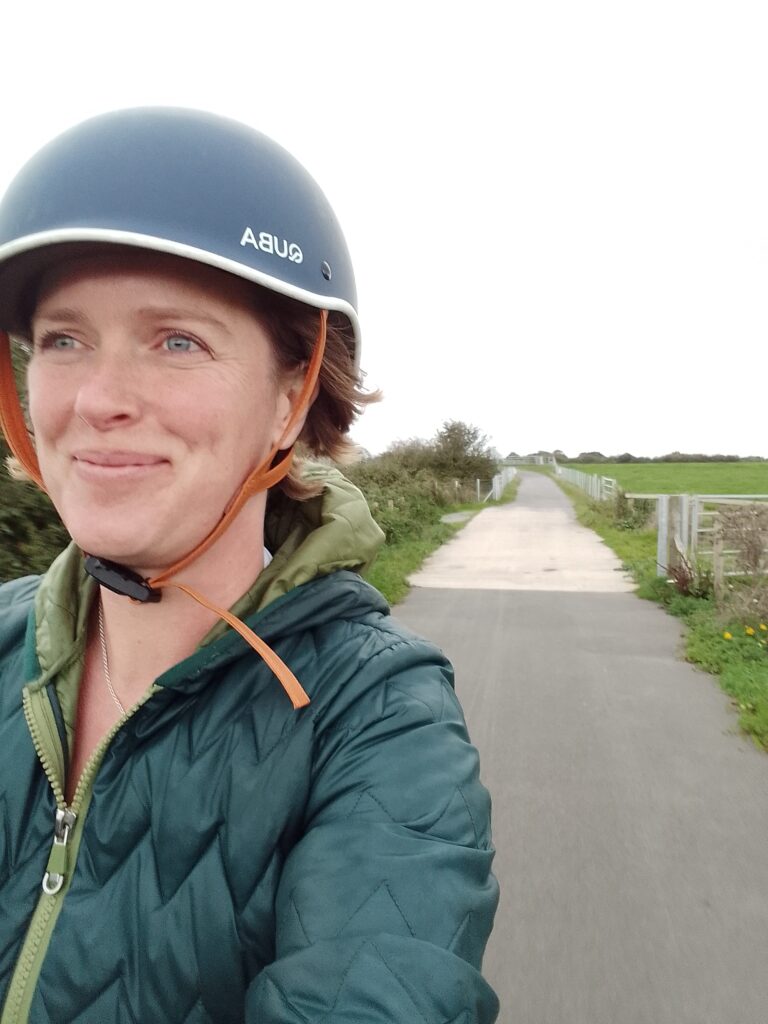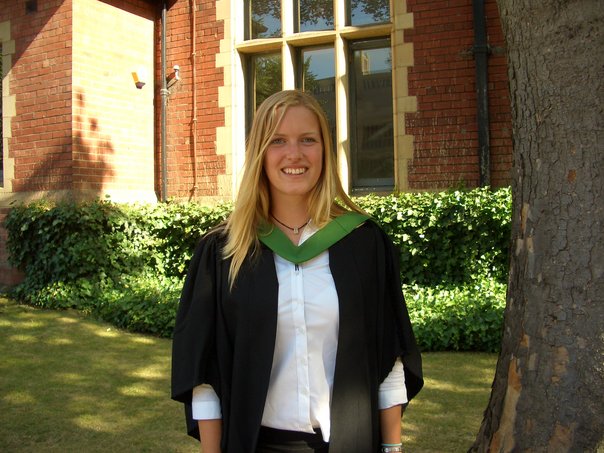Green careers week – Nikki’s route to Energy Sparks

This is me, last month. I was cycling home from a school I visited for work along a cycle path that opened earlier this year. A path that was created by my former colleagues at my Local Authority. This was a good day.
This week is Green Careers Week, so I thought I would write up a little about how I got where I am now and what it means to me to have what I consider a green career. I have always been fascinated by the routes people take through their working lives – the decisions they have to make and the changes in direction they might take. I think it’s really helpful for people starting out, or considering a change, to know what other people have done. So here we go.
At school I was fairly bright – good at most things, not brilliant at anything. I enjoyed maths and science and those were going to be my best grades although I also liked drama and design technology (although not the planning bit, just the making). I told my careers adviser I was going to do maths at university because I was good at it. She said that was a terrible reason to do a subject and I should do something I loved, but I didn’t really have a subject I loved or a career I wanted. I only knew the jobs I could see around me – doctor, teacher, shop keeper etc.
So I did maths – for three months. I realised quite quickly (I think it might have been the imaginary numbers that did it for me), that I wanted to do something where I could see the purpose of doing it. I switched to Meteorology and Atmospheric Science. It still had a lot of maths and science in it, but also clouds and storms! Going to university was fantastic. It gave me independence, education, sport, friendship and ultimately my husband and career.
I used data for my dissertation – on the atmospheric dispersion of air pollution from the Buncefield fire in 2005 – from a company called AEA Technology. In a distracted moment while doing my research I found their graduate recruitment page and later applied.

AEA Technology went through many changes while I was there. By the time I left it was part of the engineering firm, Ricardo. I worked with lots of people who were nationally and internationally known for their work so I learned a lot and made excellent friendships. I also got married, started a family and later relocated to the west country and worked from Ricardo’s Bristol office.
Over the 13 years I was with Ricardo, I worked on forecasting air quality; reporting greenhouse gas emissions to the EU and UN; estimating the UK’s Local Authority CO2 emissions; updating the EU’s air pollutant emissions inventory guidance and advising local and national governments in the UK, Africa and Asia on how to estimate their emissions and build climate action plans.
Prompted by the IPCC’s special report on 1.5C warming in 2019, I decided that I wanted to have a more active role in climate, rather than just measuring and reporting emissions. I offered my time to my local council to help them with their new net zero goal, then soon after that they advertised for a climate emergency project manager. It seemed like the perfect next step.
While it’s not always the most thankful of tasks, I would recommend that everyone work in the public sector for at least some of their lives. It gave me a much better appreciation and understanding of where my taxes go, why my vote matters and how difficult decisions are made. In my role, I worked with people from every part of the council – social services, libraries, highways, planning, housing, councillors, directors, even the CEO. I delivered Carbon Literacy Training to over 200 people, which helped build my understanding of how everything worked and their understanding of climate change and their role in acting on it. Being the second council in the whole country to receive a silver Carbon Literacy award was a very proud moment for me.
This was an incredibly varied role, although the pandemic hit a month in and changed things significantly. I still worked with local businesses and community groups; attended workshops about the regeneration of town centres; developed decarbonisation plans for council buildings; shared ideas with other local councils; we even ran an art competition about imagining a net zero future for North Somerset (see https://www.instagram.com/picture_this_art_competition_/).
After 2.5 years at North Somerset Council, I felt that I had got plans in place and an excellent team, so I passed that role onto someone with much more council experience who could turn those plans into reality. My current role at Energy Sparks came up just at the right time and it felt like a wonderful balance between doing and influencing, with a generous sprinkling of playing with numbers and charts thrown in!
Now I’m working with schools to reduce their energy consumption and therefore their greenhouse gas emissions and energy bills. I spend an awful lot of time interpreting graphs (it’s not rocket science but I’m still quite pleased that I’m pretty good at it). I spot when a school’s heating is coming on too early, or an appliance on a timer is using energy throughout the holidays. I alert schools to these sorts of issues and work with our team to continuously improve what we do.
In the two years since I joined Energy Sparks, I have visited lots of schools; run workshops and virtual energy audits; I have spoken at conferences (see image below) and delivered training. I love being able to alert schools to issues, help them find solutions and spot saving in their data within such short timescales. We’re able to see results within a week, where working on a regional or national scale it would take many years. Last year, the average saving made by an Energy Sparks school was over £5,000 and 7 tonnes of CO2. There are over 20,000 schools in this country – imagine the possibilities!

I’m not sure what I would change if I started all over again. Although I cringe at small mistakes or things I might do differently every single day, I think the big things have generally worked out well (so maybe I need to let myself off on the small stuff).
When people say do what you love, I think I now realise that doesn’t have to be a huge career ambition like dreaming to be a vet or a pilot or to save the whales. It can just mean that you use skills and tools every day that you enjoy using. I now realise that I love working with numbers. It doesn’t have to be huge complex calculations, it can just be adding some things up, spotting patterns and finding meaning in those patterns. I could do what I do as an accountant, an economist, an engineer or a government statistician. But I’m able to use my skills to do something that I believe is useful to the world and the people around me. That is a green career.
My colleague Becca has created a video about her career in sustainability here: Becca’s career in Sustainability – YouTube